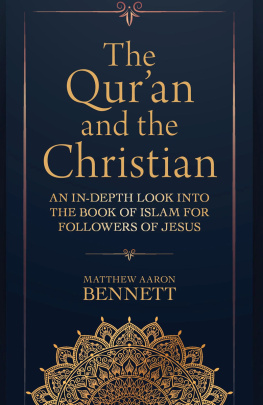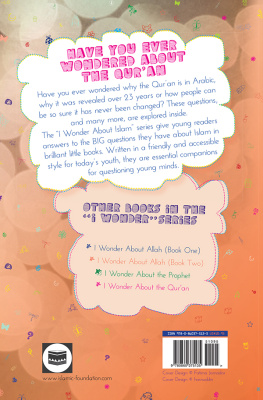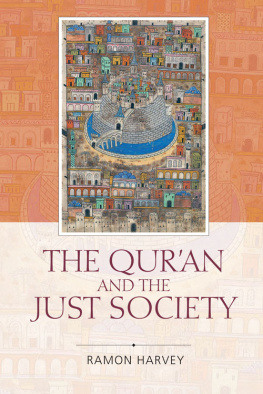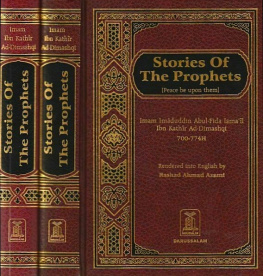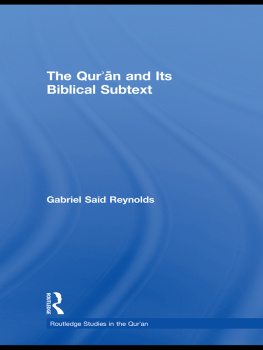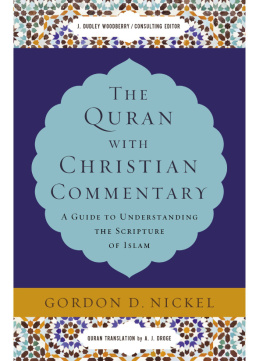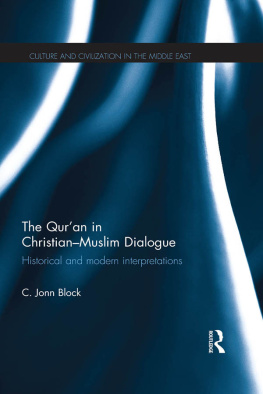BIBLICAL PROPHETS
IN THE QUR'N
AND
MUSLIM LITERATURE
ROUTLEDGE STUDIES IN THE QUR'N
Editor: Andrew Rippin, University of Victoria
In its examination of critical issues in the scholarly study of the Qur'n and its commentaries, this series targets the disciplines of archaeology, history, textual history, anthropology, theology and literary criticism. The contemporary relevance of the Qur'n in the Muslim world, its role in politics and in legal debates are also dealt with, as are debates surrounding Qur'nic studies in the Muslim world.
LITERARY STRUCTURES OF RELIGIOUS MEANING
IN THE QUR'N
Edited by Issa J. Boullata
THE DEVELOPMENT OF EXEGESIS IN EARLY ISLAM
The Authenticity of Muslim Literature from the Formative Period
Herbert Berg
BIBLICAL PROPHETS IN THE QUR'N
AND MUSLIM LITERATURE
Roberto Tottoli
BIBLICAL PROPHETS
IN THE QUR'N
AND
MUSLIM LITERATURE
Roberto Tottoli

LONDON AND NEW YORK
First Published in 2002
by Routldge
2 Park Square, Milton Park, Abingdon, Oxon, OX14 4RN
270 Madison Ave, New York NY 10016
Transferred to Digital Printing 2009
2002 Roberto Tottoli
This is a translation of:
I profeti biblici nella tradizione islamica, Paideia, Brescia 1999
Translation: Michael Robertson 2001
Typeset in Baskerville by LaserScript Ltd, Mitcham, Surrey
All rights reserved. No part of this book may be reprinted or reproduced or utilised in any form or by any electronic, mechanical, or other means, now known or hereafter invented, including photocopying and recording, or in any information storage or retrieval system, without permission in writing from the publishers.
British Library Cataloguing in Publication Data
A catalogue record of this book is available from the British Library
Library of Congress Cataloguing in Publication Data
A catalogue record for this book has been requested
ISBN10: 0-7007-1394-8 (hbk)
ISBN10: 0-415-55417-9 (pbk)
ISBN13: 978-0-700-71394-3 (hbk)
ISNB13: 978-0-415-55417-6 (pbk)
Publisher's Note
The publisher has gone to great lengths to ensure the quality of this reprint but points out that some imperfections in the original may be apparent.
to Francesca
Preface
T he Qur'n and all types of Muslim religious literature often mention the names and experiences of the characters from the Old and New Testaments, from the patriarchs to Jesus and the Apostles. These characters constitute the historical context in which the community of believers must see itself and the prophet Muhammad as bringing to a conclusion and sealing the Biblical tradition. All this is naturally presented from a specifically Islamic perspective, as set out in the Qur'n, according to which all these characters were messengers and prophets, sent to their respective peoples, to spread the same belief that would then be preached by Muhammad in the 7th century after Christ. For this reason the Qur'n regards Abraham, Moses and Jesus together with all the other characters mentioned as prophets of the Muslim tradition, in this way claiming the one and true interpretation of the significance of their mission and, in consequence, of their story. The Old and New Testaments, as a consequence, are texts which, according to Muslim opinion, have been corrupted and which only the Qur'nic interpretation, the word of God, can bring back to their original significance.
In this way, therefore, the Qur'n simplifies the historical picture: all of the prophets that came before Muammad had more or less the same function. The monotheism they preached was the same as that preached by the Arab Prophet and their stories are simply the descriptions of the vicissitudes that they were subject to with their respective peoples. For this reason, the extra-canonical exegetical tradition could not do other than follow in this established pattern, thus leaving very little room for alternative interpretations. The prevalent exegetical tradition in fact never viewed favourably symbolic interpretations or theological and philosophical interpretations in which the role of the prophets in relation to Muhammad was re-interpreted, because all of this had already been established in the Qur'n. In a sense all that the Qur'n sought was that its divine words be explained and where necessary supplemented with missing particulars.
This book is dedicated to the stories of the Biblical prophets in the Qur'n and in Muslim literature. The division of this book into two parts is above all intended to mark the difference in importance between the sacred text itself and the extra-canonical traditions: the Qur'n is the word of God and, as such, binding, both in Muhammad's time and today, and its words are true milestones around which the extra-canonical traditions turn. In the first part of this text the particularities of the stories of the Biblical prophets who are mentioned in the Qur'n are discussed and described at length, prophet by prophet, indicating, when necessary, similarities to and differences from the Jewish and Christian traditions. This comparison is not carried out with the purpose of stressing the dependence or presumed inexactitude of the Qur'n in relation to the Biblical tradition, but only to explain the particularities of the contents and the form of those parts of the Qur'n dedicated to the prophets.
The same investigation of contents would have also been possible for the second part of the book in which the extra-canonical traditions on the Biblical prophets are examined. In all genres of Muslim literature a large number of every type of tradition about the prophets is reported, in which, as in the Qur'nic passages, the same stories as those in the Bible can be recognized, or others stories which are more or less similar to the legends that can be found in the Jewish and Christian apocryphal literatures can be seen, as well as other cases where there are original narratives. A work of that kind would have transformed this book into a comparative dictionary of narrative and traditional motifs and not an enquiry into religious literary history. I have thus opted for a history of these extra-canonical traditions about the Biblical prophets, as they were when they were first spread and which genres of literature made use of them and in which ways. In this analysis therefore a history of the literature that deals principally with the beginnings (7th9th centuries), touching on the classical medieval period only in certain aspects, is delineated; in the concluding section the analysis embraces the great innovations that emerged in the works of the 20th century. All of the literature used derives almost exclusively from the most typical genres of the Islamic religious sciences of the Sunn tradition, without therefore taking into consideration certain sectarian concepts or mystical or philosophical ones that, though making original contributions, have always been considered, from many points of view, marginal.
Some clarification of the terminology used is necessary. Those who throughout the book and already in this preface are referred to as Biblical prophets include all of the characters from the Old and New Testaments. The Qur'n does not distinguish between the Patriarchs, the Prophets and Jesus but all of them are mentioned with the distinction, as discussed below, between prophets and messengers. Furthermore, it is opportune at this point to give an explanation of one of the terms most often used in the second part of this book that can give rise to some misunderstanding. I refer to tradition and use the plural form to indicate those short stories which are usually attributed to the first Muslim generations and are subsequently quoted by the authors of the following centuries. In this sense, traditions is synonymous with stories and, to a certain extent, legends. A separate category of these traditions are those which deal with the words and the acts of Muhammad, but, to avoid any confusion these are referred to with the expression the sayings of the prophet Muhammad. To refer to the Arab Prophet the transcription of the Arab name Muhammad is always used. The chapters of the Qur'n are referred to using the Arabic word sura which is not italicised. As far as quotes from the Qur'n itself are concerned the translation used is that of A.J. Arberry (



